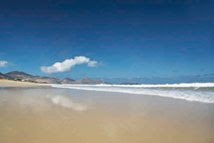 Fernando António Nogueira Pessoa; (born June 13, 1888 in Lisbon, Portugal — die November 30, 1935 in the same city) was a Portuguese poet and writer. He was also a literary critic and translator. The critic Harold Bloom referred to him in the book The Western Canon as the most representative poet of the twentieth century, along with Pablo Neruda. He was bilingual in Portuguese and English, and fluent in French.
Fernando António Nogueira Pessoa; (born June 13, 1888 in Lisbon, Portugal — die November 30, 1935 in the same city) was a Portuguese poet and writer. He was also a literary critic and translator. The critic Harold Bloom referred to him in the book The Western Canon as the most representative poet of the twentieth century, along with Pablo Neruda. He was bilingual in Portuguese and English, and fluent in French.Early years in Durban
In 1893, when Pessoa was five, his father died of tuberculosis. The following year his younger brother, aged only one, died too and his mother married again in 1895. In the beginning of 1896, he moved with his mother to Durban, capital of the former British Colony of Natal, where his stepfather was appointed Portuguese consul. The young Pessoa received his early education at Durban High School, becoming fluent in English and developing an appreciation for English literature. In the "Intermediate Examination in Arts", for admission to the Cape Town University, he was awarded the Queen Victoria Memorial Prize, recently created, for the best paper in English.
At the age of sixteen, The Natal Mercury (July 9, 1904 edition) published his poem "Hillier did first usurp the realms of rhyme...", under the name of Charles Robert Anon, along with a small introductory text: "I read with great amusement...". In December, The Durban High School Magazine published his essay «Macaulay». From February to June, 1905, in the section "The Man in the Moon", The Natal Mercury also published at least four sonnets by Fernando Pessoa: "Joseph Chamberlain", "To England I", "To England II" and "Liberty" . Joking with the name Anon, short for anonymous author, the young Pessoa revealed a fine sense of humour that he would keep during his lifetime.
In 1905, at the age of seventeen, he sailed for Lisbon via the Suez Canal on board the "Herzog", leaving Durban for good. This journey inspired the poems "Opiario" (dedicated to Mario de Sa-Carneiro) publishd in March, 1915, in Orpheu nr.1 and "Ode Maritima" (dedicated to the futurist painter Santa Rita Pintor) publishd in June, 1915, in Orpheu nr.2 by his heteronym Alvaro de Campos.
Return to Lisbon
While his family remained in South Africa, Pessoa returned to Lisbon to study literature. A student strike soon put an end to his studies and Pessoa chose to study privately at home for a year. His grandmother died in 1907 and left him a small inheritance that he spent on setting up his own publishing house, the Empreza Ibis. The venture was not a success and closed down in 1910. Ibis, the sacred bird in the Ancient Egypt would remain an important symbolic reference for him. Meanwhile, Pessoa found a job working as an assistant to a businessman, writing correspondence and translating documents. In 1915, he and other artists and poets, such as Almada Negreiros and Mário de Sá-Carneiro, created the literary magazine Orpheu, which introduced modernist literature in Portugal.
In his early years, Pessoa was influenced by English Classics such as Shakespeare, Milton and Spenser, and Romantics like Wordsworth, Coleridge, Byron, Shelley and Keats. Later on he was influenced by French symbolists Charles Baudelaire and Stephane Mallarme, mainly by Portuguese poets such as Antero de Quental, Camilo Pessanha, Cesário Verde, Antonio Nobre and modernists such as Yeats, Ezra Pound and T. S. Eliot, among many other writers. In 1918 Pessoa published in Lisbon two slim volumes of English verse: Antinous and 35 Sonnets. Along with two associates, he founded a publishing house, Olisipo, which published in 1921 a further two English poetry volumes: English Poems I-II and English Poems III by Fernando Pessoa. He wrote a guidebook to Lisbon in English, but it remained unpublished until 1992: Lisbon - What the Tourist Should See (Shearsman Books, 2008). Pessoa translated a number of English books into Portuguese, and translated the poems "The Raven" and "Annabel Lee" by Edgar Allan Poe which, along with Walt Whitman, strongly influenced him.
After his return to Lisbon in 1905, Pessoa barely left his beloved city, which inspired the poems "Lisbon Revisited" (1923 and 1926). If Franz Kafka is the writer of Prague, Fernando Pessoa is certainly the writer of Lisbon. In The Book of Disquiet, his heteronym Bernardo Soares describes some typical places of Lisbon's downtown and its "atmosphere". Bernardo Soares was supposedly an accountant, working at Vasques's office, the boss, in Douradores Street, an world Pessoa knew very well, during his almost 30 year career, as free lance correspondence translator in a number of firms. Pessoa was a frequent client at Martinho da Arcada a centennial coffee house downtown, almost an "office" for his private business and literary issues. He also frequented other coffee shops, bars and restaurants, a number of which no longer exist. The statue of Fernando Pessoa can be seen outside A Brasileira, one of the places where he would meet friends, writers and artists during the period of Orpheu. In the aristocratic district of Chiado, this coffee shop is quite close to Pessoa's birthplace: 4, Largo de Sao Carlos (in front of the Opera House), one of the most elegant quarters of Lisbon.
His interest in mysticism led Pessoa to correspond with the occultist Aleister Crowley. He later helped Crowley plan an elaborate fake suicide when he visited Portugal in 1930. He translated Crowley's poem "Hymn To Pan" into Portuguese.
Pessoa died of cirrhosis in 1935, at the age of forty-seven, almost unknown to the public and with only one book published in Portuguese: "Mensagem" (Message). He left a lifetime of unpublished and unfinished work (over 27,000 pages manuscript and typed that have been housed in the Portuguese National Library since 1986). The heavy burden of editing this huge work is still in progress. In 1988 (the centenary of his birth), Pessoa's remains were moved to the Jerónimos Monastery, in Lisbon, where Vasco da Gama, Luís de Camões, and Alexandre Herculano are also buried.
Pessoa's portrait was on the 100-escudo banknote.
Heteronyms
Alberto Caeiro
Pessoa's earliest heteronym, at the age of six, was the Chevalier de Pas. Other c
 hildhood heteronyms included Dr Pancrácio and David Merrick, followed by Charles Robert Anon and Alexander Search; these were eventually succeeded by others, most notably: Alberto Caeiro, Álvaro de Campos, Ricardo Reis and semi-heteronym Bernardo Soares. Translator Richard Zenith notes that Pessoa eventually established at least seventy-two heteronyms. The heteronyms possess distinct temperaments, philosophies, appearances and writing styles. According to Pessoa, the heteronym closest to his personality was Bernardo Soares, the author of The Book of Disquiet.
hildhood heteronyms included Dr Pancrácio and David Merrick, followed by Charles Robert Anon and Alexander Search; these were eventually succeeded by others, most notably: Alberto Caeiro, Álvaro de Campos, Ricardo Reis and semi-heteronym Bernardo Soares. Translator Richard Zenith notes that Pessoa eventually established at least seventy-two heteronyms. The heteronyms possess distinct temperaments, philosophies, appearances and writing styles. According to Pessoa, the heteronym closest to his personality was Bernardo Soares, the author of The Book of Disquiet.Alberto Caeiro was Pessoa's first great heteronym; summarized by Pessoa, writing: "He sees things with the eyes only, not with the mind. He does not let any thoughts arise when he looks at a flower... the only thing a stone tells him is that it has nothing at all to tell him... this way of looking at a stone may be described as the totally unpoetic way of looking at it. The stupendous fact about Caeiro is that out of this sentiment, or rather, absence of sentiment, he makes poetry."
What this means, and what makes Caeiro such an original poet is the way he apprehends existence. He does not question anything whatsoever; he calmly accepts the world as it is. The recurrent themes to be found in nearly all of Caeiro's poems are "wide-eyed child-like wonder at the infinite variety of nature", as noted by a critic. He is free of metaphysical entanglements. Central to his world-view is the idea that in the world around us, all is surface: things are precisely what they seem, there is no hidden meaning anywhere.
He manages thus to free himself from the anxieties that batter his peers; for Caeiro, things simply exist and we have no right to credit them with more than that. Our unhappiness, he tells us, springs from our unwillingness to limit our horizons. As such, Caeiro attains happiness by not questioning, and by thus avoiding doubts and uncertainties. He apprehends reality solely through his eyes, through his senses. What he teaches us is that if we want to be happy we ought to do the same. Octavio Paz called him "the innocent poet". Paz made a shrewd remark on the heteronyms: "In each are particles of negation or unreality. Reis believes in form, Campos in sensation, Pessoa in symbols. Caeiro doesn't believe in anything. He exists."
Poetry before Caeiro was essentially interpretative; what poets did was to offer an interpretation of their perceived surroundings; Caeiro does not do this. Instead, he attempts to communicate his senses, and his feelings, without any interpretation whatsoever.
Caeiro attempts to approach Nature from a qualitatively different mode of apprehension; that of simply perceiving (an approach akin to phenomenological approaches to philosophy). Poets before him would make use of intricate metaphors to describe what was before them; not so Caeiro: his self-appointed task is to bring these objects to the reader's attention, as directly and simply as possible. Caeiro sought a direct experience of the objects before him.
As such it is not surprising to find that Caeiro has been called an anti-intellectual, anti-Romantic, anti-subjectivist, anti-metaphysical...an anti-poet, by critics; Caeiro simply—is. He is in this sense very unlike his creator Fernando Pessoa: Pessoa was besieged by metaphysical uncertainties; these were, to a large extent, the cause of his unhappiness; not so Caeiro: his attitude is anti-metaphysical; he avoided uncertainties by adamantly clinging to a certainty: his belief that there is no meaning behind things. Things, for him, simply—are.
Caeiro represents a primal vision of reality, of things. He is the pagan incarnate. Indeed Caeiro, Richard Zenith tells us, was not simply a pagan but 'paganism itself'.
The critic Jane M. Sheets sees the insurgence of Caeiro—who was Pessoa's first major heteronym—as essential in founding the later poetic personas: "By means of this artless yet affirmative anti-poet, Caeiro, a short-lived but vital member of his coterie, Pessoa acquired the base of an experienced and universal poetic vision. After Caeiro's tenets had been established, the avowedly poetic voices of Campos, Reis and Pessoa himself spoke with greater assurance."
Ricardo Reis
Reis sums up his philosophy of life in his own words, admonishing: 'See life from a distance. Never question it. There's nothing it can tell you.' Like Caeiro, whom he admires, Reis defers from questioning life. He is a modern pagan who urges one to seize the day and accept fate with tranquility. 'Wise is the one who does not seek', he says; and continues: 'the seeker will find in all things the abyss, and doubt in himself.' In this sense Reis shares essential affinities with Caeiro.

Believing in the Greek gods, yet living in a Christian Europe, Reis feels that his spiritual life is limited, and true happiness cannot be attained. This, added to his belief in Fate as a driving force for all that exists, as such disregarding freedom, leads to his epicureanist philosophy, which entails the avoidance of pain, defending that man should seek tranquility and calm above all else, avoiding emotional extremes.
Where Caeiro wrote freely and spontaneously, with joviality, of his basic, meaningless connection to the world, Reis writes in an austere, cerebral manner, with premeditated rhythm and structure and a particular attention to the correct use of the language, when approaching his subjects of, as characterized by Richard Zenith,'the brevity of life, the vanity of wealth and struggle, the joy of simple pleasures, patience in time of trouble, and avoidance of extremes'.
In his detached, intellectual approach, he is closer to Fernando Pessoa's constant rationalization, as such representing the ortonym's wish for measure and sobriety and a world free of troubles and respite, in stark contrast to Caeiro's spirit and style. As such, where Caeiro's predominant attitude is that of joviality, his sadness being accepted as natural ('My sadness,' Caeiro says, 'is a comfort for it is natural and right.'), Reis is marked by melancholy, saddened by the impermanence of all things.
Ricardo Reis is the main character of José Saramago's 1986 novel The Year of the Death of Ricardo Reis.
Alvaro de Campos
Alvaro de Campos manifests, in a way, as an hyperbolic version
 of Pessoa himself. Of the three heteronyms he is the one who feels most strongly, his motto being 'to feel everything in every way.' 'The best way to travel,' he wrote, 'is to feel.' As such, his poetry is the most emotionally intense and varied, constantly juggling two fundamental impulses: on the one hand a feverish desire to be and feel everything and everyone, declaring that 'in every corner of my soul stands an altar to a different god '(alluding to Walt Whitman's desire to 'contain multitudes'), on the other, a wish for a state of isolation and a sense of nothingness.
of Pessoa himself. Of the three heteronyms he is the one who feels most strongly, his motto being 'to feel everything in every way.' 'The best way to travel,' he wrote, 'is to feel.' As such, his poetry is the most emotionally intense and varied, constantly juggling two fundamental impulses: on the one hand a feverish desire to be and feel everything and everyone, declaring that 'in every corner of my soul stands an altar to a different god '(alluding to Walt Whitman's desire to 'contain multitudes'), on the other, a wish for a state of isolation and a sense of nothingness.As a result, his mood and principles varied between violent, dynamic exultation, as he fervently wishes to experience the entirety of the universe in himself, in all manners possible (a particularly distinctive trait in this state being his futuristic leanings, including the expression of great enthusiasm as to the meaning of city life and its components) and a state of nostalgic melancholy, where life is viewed as, essentially, empty.
One of the poet's constant preoccupations, as part of his dichotomous character, is that of identity: he does not know who he is, or rather, fails at achieving an ideal identity. Wanting to be everything, and inevitably failing, he despairs. Unlike Caeiro, who asks nothing of life, he asks too much. In his poetic meditation 'Tobacco Shop' he asks:
How should I know what I'll be, I who don't know what I am?
Be what I think? But I think of being so many things!
Fernando Pessoa-
 himself
himself'Fernando Pessoa-himself' is not the 'real' Fernando Pessoa. Like Caeiro, Reis and Campos—Pessoa 'himself' embodies only aspects of the poet, Fernando Pessoa's personality is not stamped in any given voice; his personality is diffused through the heteronyms. For this reason 'Fernando Pessoa-himself' stands apart from the poet proper.
'Pessoa' shares many essential affinities with his peers, Caeiro and Campos in particular. Lines crop up in his poems that may as well be ascribed to Campos or Caeiro. It is useful to keep this in mind as we read this exposition.
The critic Leland Guyer sums up 'Pessoa': "the poetry of the orthonymic Fernando Pessoa normally possesses a measured, regular form and appreciation of the musicality of verse. It takes on intellectual issues, and it is marked by concern with dreams, the imagination and mystery."
Richard Zenith calls 'Pessoa' most intellectual and analytic poetic persona.' Like Alvaro de Campos, Pessoa-himself was afflicted with an acute identity crisis. Pessoa-himself has been described as indecisive and doubt plagued, as restless. Like Campos he can be melancholic, weary, resigned. The strength of Pessoa-himself's poetry rests in his ability to suggest a sense of loss; of sorrow for what can never be.
A constant theme in Pessoa's poetry is Tedio, or Tedium. The dictionary defines this word simply as 'a condition of being tedious; tediousness or boredom.' This definition does not sufficiently encompass the peculiar brand of tedium experienced by Pessoa-himself. His is more than simple boredom: it is from a world of weariness and disgust with life; a sense of the finality of failure; of the impossibility of having anything to want.
'The impossibility of having anything to want': this is Tedio for Pessoa-himself. It is one thing to have nothing to do or want, but to be deprived even of this...is tedium. Kierkegaard tells how if asked to choose between the two; between a perpetual state of boredom, or eternal bodily pain; he would choose—eternal bodily pain. Pessoa-himself, it would seem, would concur with the melancholy Dane.
"The house of Pessoa - Casa Fernando Pessoa"



